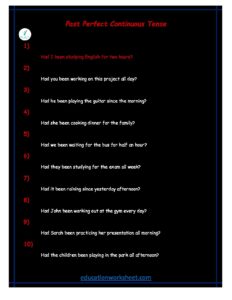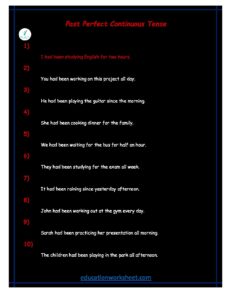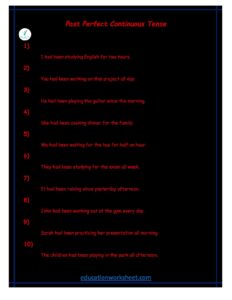how to converting Past Perfect Continuous Tense interrogative sentences to negative from
how to converting Past Perfect Continuous Tense interrogative sentences to negative from
Table of Contents
I. Introduction A. Understanding Past Perfect Continuous Tense B. Purpose of Converting to Negative II. Basic Structure of Past Perfect Continuous Tense III. Converting Interrogative Sentences to Negative A. Rule 1: Add “not” after the auxiliary verb B. Rule 2: Change the position of “not” C. Rule 3: Combine “had” and “not” IV. Common Examples A. From Interrogative to Negative B. Practice Exercises V. Conclusion VI. References
I. Introduction
A. Understanding Past Perfect Continuous Tense

The Past Perfect Continuous Tense is a verb tense used to describe actions or situations that were ongoing in the past, had a duration, and were completed before another past action or point in time. It is formed by combining the past perfect tense of the auxiliary verb “have” (had) with the base form of the main verb and adding “-ing.” Interrogative sentences in the past perfect continuous tense are used to ask questions about actions that had been ongoing in the past. In this guide, we will explore how to convert these interrogative sentences into negative sentences.
B. Purpose of Converting to Negative
Converting interrogative sentences in the past perfect continuous tense to negative sentences is essential for communicating the absence or negation of an action that was ongoing in the past. This conversion allows us to convey the idea that the action or situation did not happen as opposed to merely asking about its occurrence.
II. Basic Structure of Past Perfect Continuous Tense

Before we delve into converting interrogative sentences to negative, let’s review the basic structure of the past perfect continuous tense:
Subject + “had” + been + base form of the verb + “-ing” (e.g., They had been working).
III. Converting Interrogative Sentences to Negative
Converting interrogative sentences in the past perfect continuous tense to negative sentences involves a few key rules.
A. Rule 1: Add “not” after the auxiliary verb
The first step in converting interrogative sentences to negative is to add the word “not” immediately after the auxiliary verb “had.” For example:
Interrogative: Had they been studying? Negative: They had not been studying.
B. Rule 2: Change the position of “not”
In English, the word “not” can be positioned in different places in a sentence, but when converting interrogative sentences to negative, it is commonly placed after the auxiliary verb, as mentioned in Rule 1. However, you can also place it after the subject to emphasize the negation. For example:
Interrogative: Had she been cooking? Negative: She had been not cooking.
C. Rule 3: Combine “had” and “not”
To create a more concise and commonly used negative form, you can combine “had” and “not” to form the contraction “hadn’t.” This is the preferred way to express negation in most cases.
Interrogative: Had we been waiting? Negative: We hadn’t been waiting.
IV. Common Examples
Let’s look at some common examples to illustrate how to convert interrogative sentences in the past perfect continuous tense to negative sentences:
A. From Interrogative to Negative
- Interrogative: Had he been sleeping? Negative: He had not been sleeping. (Alternate: He had been not sleeping.)
- Interrogative: Had they been working? Negative: They hadn’t been working.
- Interrogative: Had she been traveling? Negative: She had not been traveling. (Alternate: She had been not traveling.)
- Interrogative: Had you been studying? Negative: You hadn’t been studying.
how to converting Past Perfect Continuous Tense interrogative sentences to negative from

B. Practice Exercises
Now, let’s practice converting interrogative sentences to negative. Try converting the following interrogative sentences into negative sentences:
- Interrogative: Had we been dancing?
- Interrogative: Had the cat been sleeping?
- Interrogative: Had they been playing football?
- Interrogative: Had she been singing?

